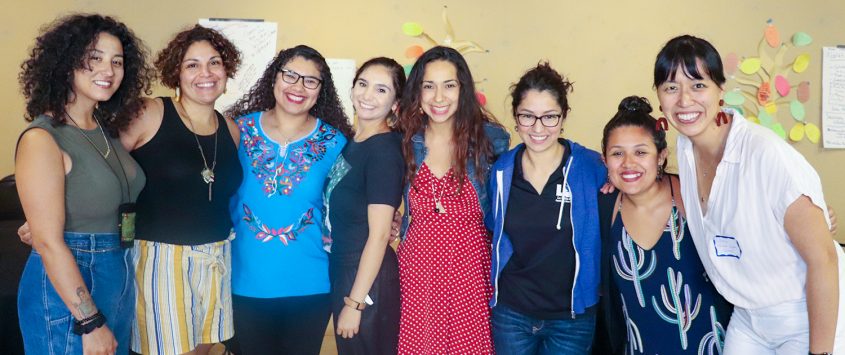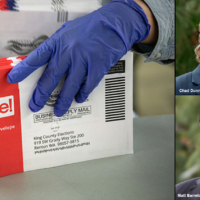
LPPI Student Fellow Gains Insight at Latinx Criminal Justice Convening Second-year MPP student María Morales represents UCLA Luskin at a Texas gathering to discuss how criminal justice and immigration systems impact U.S. Latinos
Leadership development is a key component of the Latino Policy and Politics Initiative (LPPI) at UCLA Luskin, allowing student fellows to gain hands-on policy experience and realize opportunities to develop management skills, as well as champion equity and innovation.
María Morales, a second-year Master of Public Policy student and a 2019-20 LPPI student fellow, became the latest example of this idea in action when she was selected to attend the 5th annual Latinx Criminal Justice Convening in Brownsville, Texas, in June.
Morales is serving as a project manager for an LPPI criminal justice system project that is currently underway, and she saw the conference as a professional development opportunity that allowed her to familiarize herself even further with research and efforts in the field. She also welcomed the opportunity to talk about issues of importance to Latinos in her home state of Texas.
One benefit of the trip for Morales was getting to see how a multilingual approach was incorporated.
“I was impressed by the way that interpreters established a multilingual culture during the gathering, ensuring Spanish and English-only speakers communicated smoothly with each other,” she said.
It was clear to Morales that organizers understood that language barriers often hinder efforts within the justice system to combat injustices. Community-centered, multigenerational sensitivity to interpretation is also beneficial, Morales explained, when formerly incarcerated individuals are welcomed home for the first time.
“It promotes a healing component for all participants,” she said.
The convening was organized by LatinoJustice PRLDEF in partnership with Rio Grande Valley Equal Voice Network. A variety of local and national organizations came to the U.S.-Mexico border town of Brownsville to engage in conversations about Latinos in the criminal justice and immigration systems.
Organizers said the two-day encuentro was intended to create a space for Latino leaders, activists, academics and impacted community members to explore connections within the criminal justice and immigration systems across the United States. They also discussed strategies to promote an inclusive movement that does not leave anyone behind.
Morales said she found the intersection between immigration, incarceration, criminality and the war on drugs very interesting. The degree of overlap of those issues was new to her.
“I had not realized how all these were intertwined and played a role in the relationship between the Latinx community and the criminal justice system,” she said.
Another impactful experience for Morales related to the general lack of data about the Latinx community in the United States. Based on her research for LPPI, she was able to engage in a “fishbowl conversation” on the topic, bringing a student’s perspective to the discussion.
Morales said she was inspired and motivated by the opportunity to be part of these types of conversations for the first time in such a setting.
“Speaking on the lack of Latinx data in the criminal justice and juvenile justice systems underscored the importance of research and the need to identify these disparities in order to enact meaningful policies based on accurate evidence,” she said.
During the gathering in Brownsville, community members highlighted their work on the ground to end collaboration between state and local police departments with U.S. Immigration and Customs Enforcement efforts in the states of Texas and Georgia.
Another topic of discussion related to a jail closure in Los Angeles and efforts to prevent construction of a replacement. The intersection of criminal law and immigration law — often referred to as “crimmigration” — was the focal point of these conversations, with attorneys explaining the importance of litigation and the need for advocates to be patient during a legal process that often becomes lengthy. A lack of lawyers with expertise in social justice was also mentioned, Morales said.
This topic was of special importance to Morales because she will soon begin working with a group of other MPP candidates on their Applied Policy Project, and “crimmigration is a topic we are interested in exploring for our capstone project,” she said. “Learning more about its impact on the community at this convening has further piqued my interest.”
Morales found the convening enjoyable and insightful. “It was an honor being able to attend this convening and feel such passion and dedication in the room,” she said.







Hi
It’s a matter of pride that “María Morales” selected to attend the 5th annual Latinx Criminal Justice Convening in Brownsville and became the latest example for us. Really we are so happy to hear that news. Congrats Morales.
Keep up the great work.
Best of luck
Regards..
Mike